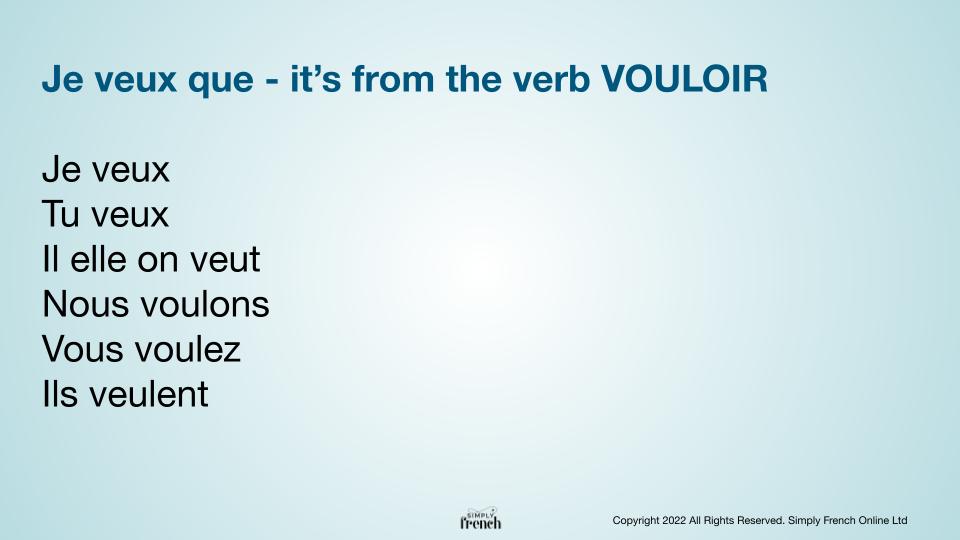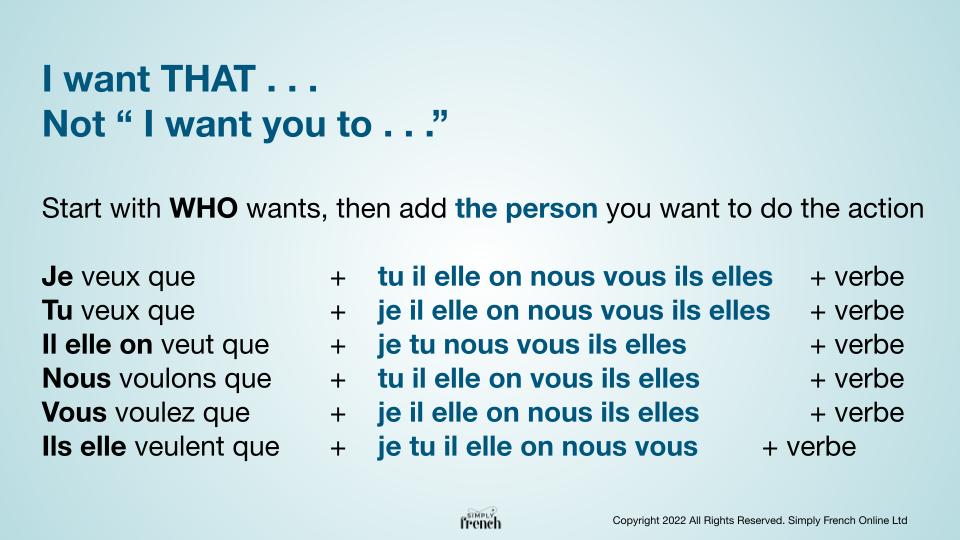Simple Subjunctive I want you to in French
Feb 23, 2022You can give orders using the imperative but there’s another way to do it: with the expression “je veux que”. In addition, this structure allows you to express desires.
In this post, I will help you decompose its pattern into a formula that can stick in your brain more easily. Step by step, you can focus on each part of the structure then use your own examples and use it smoothly.
“Je veux que cette mini leçon soit plaisante” (I want you to enjoy this mini lesson).
Let’s start.

The French conjugation of VOULOIR
First, let’s review our main verb: VOULOIR (to want). Since it’s an irregular verb, you want to memorize it.
To help you, remember that the root is the same for all the subjects (veu_) except with “nous” and “vous” that share the root of the infinitive (voul_).
Then, simply add the usual endings for the irregular verbs:
- je / j ________ s or x
- tu ________ s or x
- il / elle ________ d or t
- nous ________ ons
- nous ________ ez or ites (very rare)
- ils / elles ________ ent or ont
Therefore, your French verb “vouloir” will be like this:
- je veux
- tu veux
- il / elle veut
- nous voulons
- nous voulez
- ils / elles veulent
This is your basic verb. Now, if “something” else follows it, it’s another story…

The subjunctive to express desires
Now, you know how to conjugate “vouloir”. However, if you see, say or write “que” after, you will trigger the subjunctive!
Why? Because chances are you are expressing either a wish or an order. And there’s no guarantee it will happen, hence this complex tense…

Expressing orders with the French verb of VOULOIR
At this stage, you understand the intention behind the structure “vouloir que”. But, don’t try to translate literally from English because it doesn’t work.
Indeed, in English, you would say “I want you to do something” while in French it’s rather “I want that you do something”.
Basically, there are 2 actors: the person who wants something and the person or the object doing the action.
The pattern is the following:
SUBJECT (with wish) + VOULOIR (conjugated) + SUBJECT (doing something) + VERB (subjunctive)
In the next session, we will focus on the second part of the structure: the subjunctive.

Most common irregular French subjunctives
In 2 other posts dealing with the subjunctive, I explain how to get the root of your verb and give you the specific endings of the subjunctive:
We also see how to conjugate the irregular verbs of ÊTRE and FAIRE. Remember for your learning’s sake, it’s better to learn little by little so it sticks in your head.
Today, let’s have a look at 4 other main irregular French verbs.
The subjunctive of the verb AVOIR (to have)
Another everyday verb you cannot miss:
- que j’aie
- que tu aies
- qu’il / elle / on ait
- que nous ayons
- que vous ayez
- qu’ils / elles aient
The subjunctive of the verb ALLER (to go)
Because you need it a lot:
- que j’aille
- que tu ailles
- qu’il / elle / on aille
- que nous allions
- que vous alliez
- qu’ils / elles aillent
The subjunctive of the verb POUVOIR (can)
Only the root is irregular, the rest is regular:
- que je puisse
- que tu puisses
- qu’il / elle / on puisse
- que nous puissions
- que vous puissiez
- qu’ils / elles puissent
The subjunctive of the verb VOULOIR (to want)
This is one is very tricky with a different base for “nous” and “vous”:
- que je veuille
- que tu veuilles
- qu’il / elle / on veuille
- que nous voulions
- que vous vouliez
- qu’ils / elles veuillent
The subjunctive of the verb SAVOIR (to know)
Like “pouvoir”, this one has an irregular root but the endings are regular:
- que je sache
- que tu saches
- qu’il / elle / on sache
- que nous sachions
- que vous sachiez
- qu’ils / elles sachent

How to give orders and express desires in French.
The French structure “je veux que” shouldn’t be a mystery anymore because you know it triggers the subjunctive in order to express a wish or an order. Moreover, you are aware there are 2 main actors: the one with the wish and the other one doing the thing.
So, time to learn or review your verb “vouloir” and start memorizing your irregular verbs with the subjunctive.
“Je veux que vous appreniez peu par peu” (I want you to learn little by little).

To finish, “je veux que vous me disiez si vous avez des questions!” (I want you to tell me if you have questions for me).
Free Masterclass
Learn my 4 step method of how to hold meaningful french conversations the R.E.A.L. way in just 30 minutes a day.
When you signup, we'll be sending you weekly emails with additional free content

